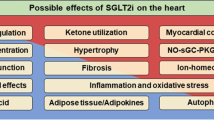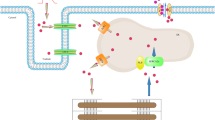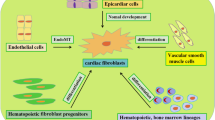Summary
β3-adrenoceptor (β3-AR) has been shown to promote myocardial apoptosis. However, the exact physiological role and importance of this receptor in the human myocardium, and its underlying mode of action, have not been fully elucidated. The present study aimed to determine the effects of β3-AR on the promotion of myocardial apoptosis and on norepinephrine (NE) injury. We analyzed NE-induced cardiomyocyte (CM) apoptosis by using a TUNEL and an annexin V/propidium iodide apoptosis aβsay. Furthermore, we investigated the NE-induced expreβsion of the apoptosis marker genes Akt and p38MAPK, their phosphorylated counterparts p-Akt and p-p38MAPK, caspase-3, Bcl-2, and Bax. In addition, we determined the effect of a 48-h treatment with a β3-AR agonist and antagonist on expression of these marker genes. β3-AR overexpression was found to increase CM apoptosis, accompanied by an increased expression of caspase-3, bax/bcl-2, and p-p38MAPK. In contrast, the β3-blocker reduced apoptosis of CMs and the associated elevated Akt expression. We identified a novel and potent anti-apoptosis mechanism via the PI3K/Akt pathway and a pro-apoptosis pathway mediated by p38MAPK.
Similar content being viewed by others
References
Mersmann HJ. Overview of the effects of beta-adrenergic receptor agonists on animal growth including mechanisms of action. J Anim Sci, 1998,76(1):160–172
Cheng HJ, Grant KA, Han QH, et al. Up-regulation and functional effect of cardiac beta3-adrenoreceptors in alcoholic monkeys. Alcohol Clin Exp Res, 2010,34(7): 1171–1181
Montaudon E, Dubreil L, Lalanne V, et al. Cardiac effects of long-term active immunization with the second extracellular loop of human β1-and/or β3-adrenoceptors in Lewis rats. Pharmacol Res, 2015,100(7):210–219
Ursino MG, Vasina V, Raschi E, et al. The beta3-adrenoceptor as a therapeutic target: current perspectives. Pharmacol Res, 2009,59(4):221–234
Michel MC, Ochodnicky P, Summers RJ. Tissue functions mediated by beta(3)-adrenoceptors-findings and challenges. Naunyn Schmiedebergs Arch Pharmacol, 2010, 382(2):103–108
Moniotte S, Kobzik L, Feron O, et al. Upregulation of beta(3)-adrenoceptors and altered contractile response to inotropic amines in human failing myocardium. Circulation, 2001,103(12):1649–1655
Bhadada SV, Patel BM, Mehta AA, et al. beta(3) Receptors: role in cardiometabolic disorders. Ther Adv Endocrinol Metab, 2011,2(2):65–79
Balligand JL. Beta3-adrenoreceptors in cardiovasular diseases: new roles for an "old" receptor. Curr Drug Deliv, 2013,10(1):64–66
Watts VL, Sepulveda FM, Cingolani OH, et al. Anti-hypertrophic and anti-oxidant effect of beta3-adrenergic stimulation in myocytes requires differential neuronal NOS phosphorylation. J Mol Cell Cardiol, 2013,62: 8–17
Rozec B, Quang TT, Noireaud J, et al. Mixed beta3-adrenoceptor agonist and alpha1-adrenoceptor antagonist properties of nebivolol in rat thoracic aorta. Br J Pharmacol, 2006,147(7):699–706
Gan RT, Li WM, Wang X, et al. Effect of beta3-adrenoceptor antagonist on the cardiac function and expression of endothelial nitric oxide synthase in a rat model of heart failure. Zhongguo Wei Zhong Bing Ji Jiu Yi Xue (Chinese), 2007,19(11):675–678
Tamburella A, Micale V, Leggio GM, et al. The beta3 adrenoceptor agonist, amibegron (SR58611A) counteracts stress-induced behavioral and neurochemical changes. Eur Neuropsychopharmacol, 2010,20(10):704–713
Kong YH, Li WM, Tian Y. Effect of beta3-adrenoreceptors agonist on beta3-adrenoreceptors expression and myocyte apoptosis in a rat model of heart failure. Zhongguo Wei Zhong Bing Ji Jiu Yi Xue (Chinese), 2004,16(3):142–147
Zheng M, Fu YH, Xiao DZ. β3-AR regulates the anti-apoptotic effect of myocardial MIF through cGMP-PKG-p38. Zhongguo Bingli Shengli Zazhi (Chinese), 2010,26(10):1966–1977
McCain ML, Agarwal A, Nesmith HW, et al. Micromolded gelatin hydrogels for extended culture of engineered cardiac tissues. Biomaterials, 2014,35(21): 5462–5471
Yun CF, Ching SC, Sui CY, et al. Norepinephrine induces apoptosis in neonatal rat cardiomyocytes through a reactive oxygen species–TNFα–caspase signaling pathway. Cardiovasc Res, 2004,62(3):558–567
Dal MM, Casini G, Filippi L, et al. Functional involvement of beta3-adrenergic receptors in melanoma growth and vascularization. J Mol Med (Berl), 2013,91(12): 1407–1419
Chernogubova E, Cannon B, Bengtsson T. Norepinephrine increases glucose transport in brown adipocytes via beta3-adrenoceptors through a cAMP, PKA, and PI3-kinase-dependent pathway stimulating conventional and novel PKCs. Endocrinology, 2004,145(1): 269–280
Rengo G, Pagano G, Parisi V, et al. Changes of plasma norepinephrine and serum N-terminal pro-brain natriuretic peptide after exercise training predict survival in patients with heart failure. Int J Cardiol, 2014,171(3):384–389
Communal C, Singh K, Pimentel DR, et al. Norepinephrine stimulates apoptosis in adult rat ventricular myocytes by activation of the beta-adrenergic pathway. Circulation, 1998,98(13):1329–1334
Gauthier C, Rozec B, Manoury B, et al. Beta-3 adrenoceptors as new therapeutic targets for cardiovascular pathologies. Curr Heart Fail Rep, 2011,8(3):184–192
Niu X, Watts VL, Cingolani OH, et al. Cardioprotective effect of beta-3 adrenergic receptor agonism: role of neuronal nitric oxide synthase. J Am Coll Cardiol, 2012, 59(22):1979–1987
Rosa GM, Ferrero S, Nitti VW, et al. Cardiovascular safety of β(3)-adrenoceptor agonists for the treatment of patients with overactive bladder syndrome. Eur Urol, 2015,9(7):864–867
Michel MC, Harding SE, Bond RA. Are there functional beta(3)-adrenoceptors in the human heart? Br J Pharmacol, 2011,162(4):817–822
Lauber K, Bohn E, Krober SM, et al. Apoptotic cells induce migration of phagocytes via caspase-3-mediated release of a lipid attraction signal. Cell, 2003,113(6): 717–730
Olivetti G, Abbi R, Quaini F, et al. Apoptosis in the Failing Human Heart. N Engl J Med, 1997,336(16):1131–1141
Yin C, Knudson CM, Korsmeyer SJ, et al. Bax suppresses tumorigenesis and stimulates apoptosis in vivo. Nature, 1997,385(6617):637–640
Czabotar PE, Lessene G, Strasser A, et al. Control of apoptosis by the BCL-2 protein family: implications for physiology and therapy. Nat Rev Mol Cell Biol, 2014,15(1):49–63
Jhaveri DJ, Mackay EW, Hamlin AS, et al. Norepinephrine directly activates adult hippocampal precursors via beta3-adrenergic receptors. J Neurosci, 2010,30(7): 2795–2806
Sussman MA, Volkers M, Fischer K, et al. Myocardial AKT: the omnipresent nexus. Physiol Rev, 2011,91(3): 1023–1070
Cittadini A, Monti MG, Iaccarino G, et al. Adenoviral gene transfer of Akt enhances myocardial contractility and intracellular calcium handling. Gene Ther, 2006,13(1): 8–19
Kitamura Y, Koide M, Akakabe Y, et al. Manipulation of cardiac phosphatidylinositol 3-kinase (PI3K)/Akt signaling by apoptosis regulator through modulating IAP expression (ARIA) regulates cardiomyocyte death during doxorubicin-induced cardiomyopathy. J Biol Chem, 2014,289(5):2788–2800
Hammerschmidt S, Kuhn H, Gessner C, et al. Stretch-induced alveolar type II cell apoptosis: role of endogenous bradykinin and PI3K-Akt signaling. Am J Respir Cell Mol Biol, 2007,37(6):699–705
Omura T, Yoshiyama M, Kim S, et al. Involvement of apoptosis signal-regulating kinase-1 on angiotensin II-induced monocyte chemoattractant protein-1 expression. Arterioscler Thromb Vasc Biol, 2004,24(2):270–275
De Chiara G, Marcocci ME, Torcia M, et al. Bcl-2 Phosphorylation by p38 MAPK: identification of target sites and biologic consequences. J Biol Chem, 2006,281(30): 21353–21361
Ufer C, Germack R. Cross-regulation between beta 1-and beta 3-adrenoceptors following chronic beta-adrenergic stimulation in neonatal rat cardiomyocytes. Br J Pharmacol, 2009,158(1):300–313
Author information
Authors and Affiliations
Corresponding author
Additional information
This project was supported by the National Natural Science Foundation of China (No. 81260028).
Rights and permissions
About this article
Cite this article
Ma, Mm., Zhu, Xl., Wang, L. et al. β3-adrenoceptor impacts apoptosis in cultured cardiomyocytes via activation of PI3K/Akt and p38MAPK. J. Huazhong Univ. Sci. Technol. [Med. Sci.] 36, 1–7 (2016). https://doi.org/10.1007/s11596-016-1533-7
Received:
Revised:
Published:
Issue Date:
DOI: https://doi.org/10.1007/s11596-016-1533-7




